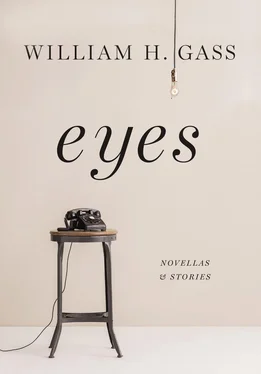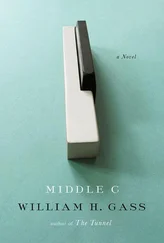He swore that were he able to do it, he would work earnestly to improve himself during the remaining existence he’d been given, giving up both fruit and stealing; he’d pass out flyers to stimulate the store; he’d memorize a new word every day and read it — one two three four — like a regiment on the march; he’d—
What, though, could be done about the ones which perched in plain view upon the walls, yet tried to lie about their presence like the purloined letter, even though they could be seen to be what they were: Koudelka, in an instant, glorious, an icon worth worship, or an Emerson, swimming in silence through reedy weeds, or that damn Evans with the foursquareface outstaring stone, or the Abbott tucked away near the rug-hugged doorway; because Gab would feel their loss even if Mr. Stu just replaced the prints and not the hangers; put up at some risk a Harry Callahan or Marc Riboud instead, since who knew if Gab had thieved them too; he’d feel their loss like a draft through a door left ajar, the hairs on the back of his neck would whisper their names in his ears; yet the Koudelka, the Feininger had to go, guilt could not be more loudly advertised. Looking at Lake Michigan Mr. Gab had muttered placement, placement, placement, three times, u-Stu supposed, to honor the three figures standing in smooth lake water, water which merged imperceptibly with a grayed-over sky, three figures perfectly decentered, and the wake of the walking bather…well…as if there’d been some calculation…if not by nature than by Callahan…alas, not a serious name. Yet Callahan, said Mr. Gab, would do.
He could not spirit these evidences from their walls. Suppose he could persuade Mr. Gab to squirrel them away in some quiet sequestership of his own where they couldn’t be seen let alone seized let alone certified as Grabbed by Gab. In so doing, in going along with Mr. Stu’s suggestion, wouldn’t Mr. Gab be confessing to his crimes? Then, though, if he did that, perhaps he’d be relieved of his reticence. What stories Mr. Gab could tell about each one — Cunningham’s magnolia, that late Baldus, or Weston’s two shells — how he had found them, stalked them, and withdrawn them from the owners’ grasps (even slipped them out of their countries) as if they were already as much his as his hand was his, leaving a handclasp to wave farewell to their properties.
At first, of course, u-Stu’s head, heart, conscience were all firmly set against the notion, voiced by their enemy from the earlier street, that Mr. Gab’s stock contained stolen articles. His mind could not figure out how Mr. Gab might have managed. He seemed taciturn not sly, blunt and biased not crafty or devious, and it was difficult to envision Mr. Gab as young, vigorous, and thievish, climbing walls like a lusty vine, seeping like pulverulent air (his word to work on for the day) under doorframe or window sash; yet so quick-fingered as to pry open cases in a wink, slip a photo from its frame in a trice, and then to saunter carefree and concealing from a museum or pretentious shop straight through customs declaring only a smile and a bit of a cough. Nor had he the heart to imagine Mr. Gab to be no more than a fence for those more slick and daring than he — as if Weasel were — what a laugh; yet appearances were deceiving, who knew better than he how that was, for he, Mr. Stu, no longer the Stupid Assistant, never had been, only looked so, on account of his one cross eye and leaking lip. Conscience…well conscience made a coward of him. Made him fear a fall. From his stool of course. From his room, job, only relation. Because he actually would have loved to believe that Mr. Gab was a Pimpernel of prints. He knew that conscience, if it had to compete with pride, wouldn’t stand a chance, and could be cowed into silence. So that to have the prince of purloiners for a pa…well…that would be okay. That would be quite all right.
He might have to get used to some such idea. Evidence was more prevalent than fingerprints. There was that envelope postmarked Montreal in which the Baldus was, contrary to custom, still kept: an absolutely perfect albumen silver print of the train station at Toulon, with the Baldus signature stamp lower right; the envelope carrying the capital letters CCA outlined in red on its front flap: rails running straight through the glass-gated shed into the everlasting; the envelope dated in a dark circle May 1, 1995: about a foot and a half wide, the sky, as almost always in Baldus, kept a clear cream, the scene so crisp as to seem seen through translucent ice; the print in heavy plastic slid between tough protective cardboard: uncluttered, freight cars parked in place, not a sight of mortal man as usually, in Édouard Baldus, was the case, a document that documented as definitely as a nailed lid; but now, so overcoated, the thing bulked in the box it was shoved in, crying out to the curious.
What a quandary. Surely Mr. Gab would see the wisdom in such a gleaning of the incriminating prints whose very excellence made them enemies, and surely he would understand, in such circumstances, the good sense in ceasing for a time to acquire anything more that might entrap Mr. Gab against his will in the terrible toils of the law; yes, surely he would have to recognize how wise it was to heed these warnings, to back off and go double doggo; but Mr. Stu knew that Mr. Gab would bite on that Sudek if it were offered, that he could not resist Quality which overcame him like a cold; because what he understood to be Quality was all that counted in the world, Mr. Stu had come to grasp that. Not warmth, it threatened the prints; not food which merely smeared the fingers; not leisure, for where would an eye go on vacation but to its graphs — to bathe in their beauty as if at a beach? Not shelter since his pictures furnished him his bricked lanes and cobbled streets, damp from rain, and all his buildings defined by shade and the white sky and the dark freshly turned fields and the veined rocks and river water frozen while falling into a steaming gorge; not a woman’s love, since the photos gave up their bodies ceaselessly and were always welcoming and bare and always without cost — after, once, you had them; further than that there was the flower petal’s perfection, the leaf’s elemental elegance, the militancy of rail and vagrancy of river line, rows of trees, a hill, a château, a vast stretch of desert dotted with death and small mean rocks. Mr. Stu had a dim hunch about how, for Mr. Gab, they had replaced his mother’s flesh. I touch you. You touch eye. That eye owns the world.
So what to do. Just broach the subject? Just say: I think, Mr. Gab, we should take these precious ones away for safer keeping. There are robbers out there looking for swag. The richness of your stock might get about, remarked here, mentioned there, whispered around until the information reaches the wrong ear. And then in the night when you are asleep up there, wherever it is, some thug may force his way in, easy enough even if the shutters are shut and the door is locked; these days they have pry irons and metal-cutting torches and lock picks and credit cards they cleverly put to illegal use. Mr. Gab, is that you, sir, someone said, startling Mr. Stu out of his thoughts as though they were dreams. We, sir, are the police. You have been denounced.
4 THE DAY OF RECKONING ARRIVES
I’ve—?
You have been informed upon.
Mr. Gab gave Mr. Stu a look of such anguish and accusation his assistant’s heart broke. Mr. Stu felt his blood was draining from him and put his hand to his nose. Then Mr. Stu returned Mr. Gab’s anguish with his own, a pitifully twisted expression on an already twisted face. Mr. Gab immediately knew his suspicion was false and unfounded; it had followed the awful announcement as swiftly as the sting from a slap; there had been no time to take thought, show sense, conceal his feeling. He realized how horribly he had wounded his adopted kid, his loyal assistant whom he’d helped from the Home and taught to grow up, reaching the rank of Mister. Mr. Gab understood now that he’d left a son a second time. Whose only mistake was being born. Or being in the neighborhood when Mr. Gab was nabbed.
Читать дальше












